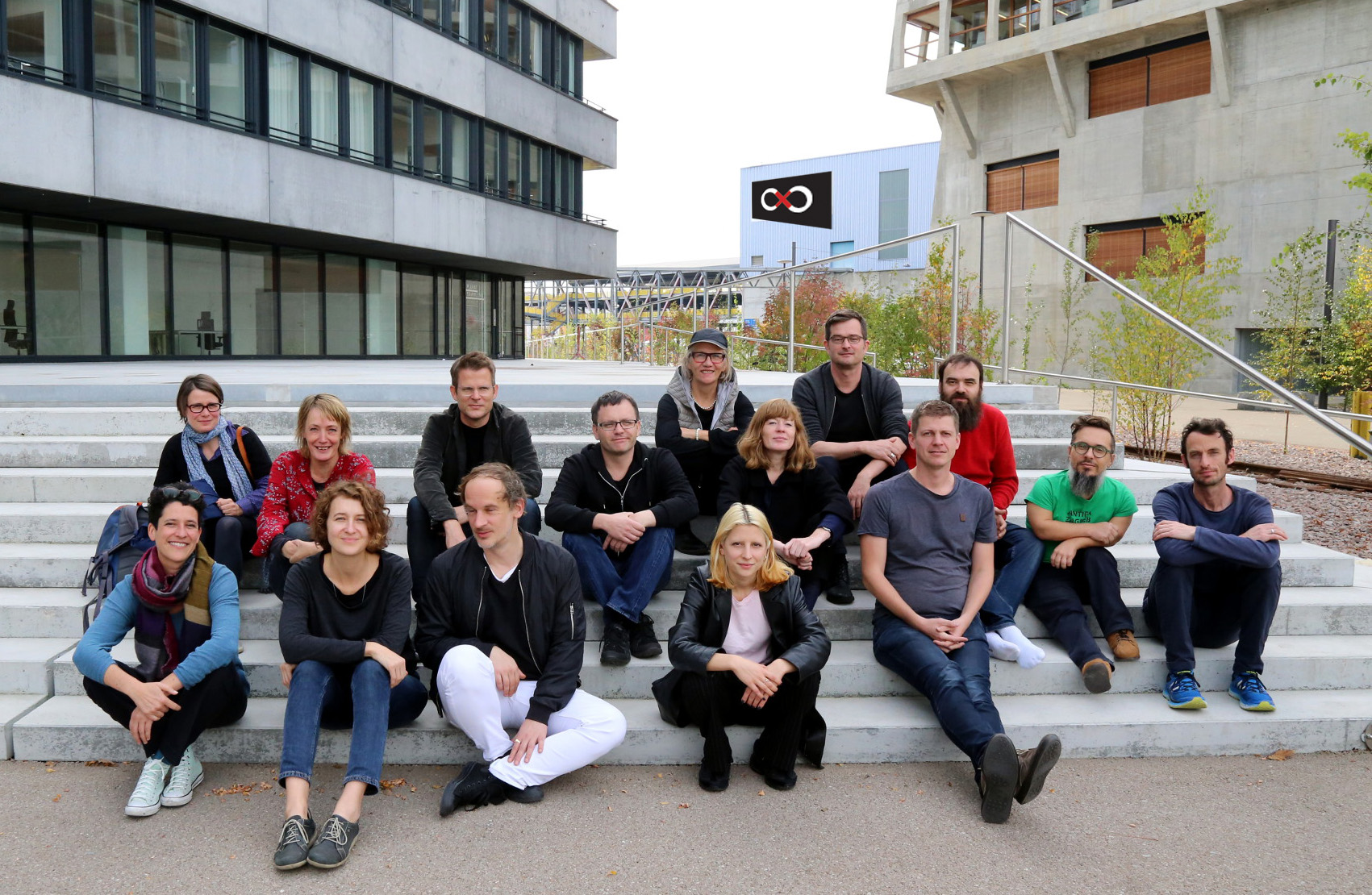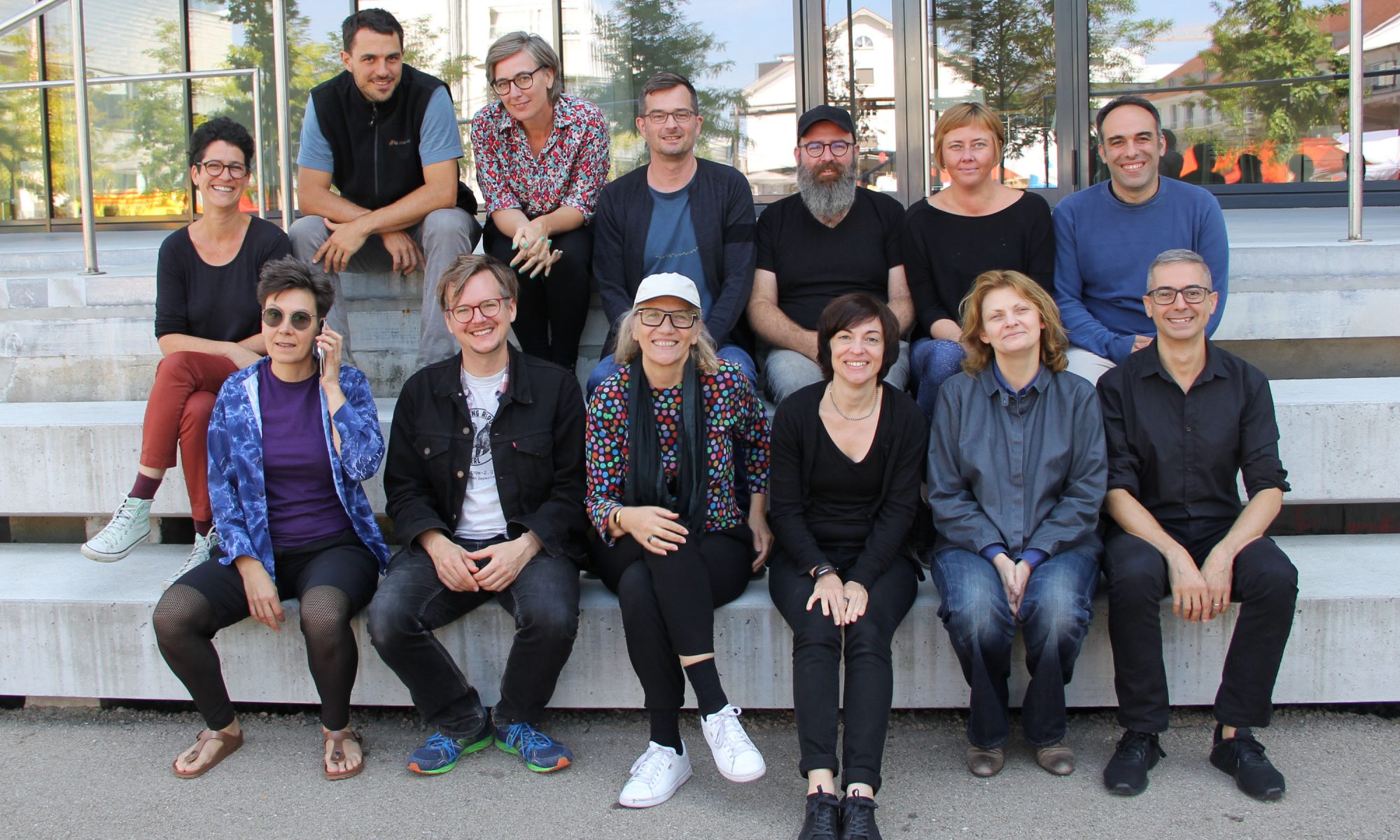19-22 October 2017
Participants (left to right):
top row: Cornelia Sollfrank & Felix Stalder (CC research project);
middle row: Annette Mächtel (UdK, Berlin), Annet Dekker (Universiteit van Amsterdam), Paul Keller (Kennisland, NL), Jan Gerber (0xdb.org), Rahel Puffert (Universtität Oldenburg), Marcell Mars (Memory of the World);
bottom row: Shusha Niederberger (CC research project), Olga Goriunova (University of London), Sebastian Lütgert(0xdb.org), Anna Calabrese (UdK, Berlin), Dusan Barok (Monoskop.org), Tomislav Medak (Memory of the World), Sean Dockray (aaaaarg.fail).
Venue: Hek (House of electronic Arts, Basel)
Report
The research meeting opened with a public talk by Olga Goriunova (Reader in Digital Culture, University of London). She started by revisiting her concept of “organizational aesthetics”, that is, the relationship between the construction of the online platform (or any other production/exhibition space) and the kinds of processes and art works that are produced and made public through it. She then extended this perspective to the relationship between the commons and art practices, in particular the changing social roles and subject positions (beyond the classic triple of artists, curator and audience) that the commons creates. She focused on the audience which is transformed even when not actively participating, introducing the notion of the “lurker”, a figure from online culture, denoting people who are subscribed to a forum or a mailing list, but only read and never actively post something, even though the technical set-up would not only allow but invite to do so. Rather than seeing this a negative, passive aspect Goriunova focused on the active role of producing a context in which posting and debating comes meaningful to begin with. The horizon of the commons, then, is not the naïve vision that everybody becomes a producer, but an expanded notion of what production is in the networked context and of keeping the hurdles low to move between different subject position within a continuum.
The two-day workshop, a mix of discussion in the plenary and focused working groups, started with a review of the artistic projects. They were all concerned with how to deal with large numbers of cultural works in the context of three interrelated crises: commercialization, copyright and cultural production. Commercialization, so the widely shared view, has been leading to a flattening of the cultural landscape by over-promoting a small types of works and undervaluing the large majority of culture, to the point of removing it from circulation. Copyright, with its peculiar notions of authorship and ownership, and the burdensome process of “clearing” rights for reuse, makes it exceedingly difficult to experiment with new ways of using digital information, particularly for established cultural institutions. Hence the need for artist not only to think about it, but to develop actively new forms. This was also motivated by what was seen as crisis of cultural production, which created a need to develop new ways of interacting with very large numbers of material (rather than a small number of canonical/auratic works) which many of these projects had worked with and, second, with the need to develop new narratives that express and make visible cultural relationship across and beyond the disciplinary and geographic categories that dominated cultural discourse after WII.
All projects tried to address these three interrelated crises in different ways, while common themes emerged during the meeting. Against the concept of ownership with its associated ideas of exclusivity and control, notions of care and custodianship were proposed developed, both theoretically and practically.
The need to navigate a broken copyright regime has been a pressing issue for many years for most of the projects; the approaches ranged from intensive, long-term lobbying at the European level on behalf of memory institutions, to dealing cooperatively with open-minded rights holders (mainly small press publishers) who increasingly understand the value of the open access archives to produces a cultural context in which their works find an audience, to approaches to more or less simply ignoring copyright. There was an understanding that copyright limits urgently needed experimentation to find the right form for archives and institutions in the digital context, where the differences between the catalogue and the work, between meta data and data increasingly blurs.
A second major theme was the transformation of what started often as individual (art) projects into infrastructures that many people ome to depend – some projects have more than 150’000 registered users. Different approaches were discussed, ranging from technical solutions (such distributed files systems (DAT)), to inter-generational (handing over the project to a new generation) and institutional approaches (decentralization and multiplication of archives).
The third major theme focused on the relationship between institutional forms, community and changing subjectivities. These projects show that archives and libraries in the digital context, when allowed to move beyond their historical institutional form, look very different. Production and preservation become mutually constitutive and the notion of care extends from the archivist/librarian to the user, which brings them into a new relationship (commoners) centring round the concern for a resource (commons) and a range practices (commoning) aimed at sustaining care. Not all participants were equally at ease with framing their activities as commoning, pointing towards a tendency in the commons discourse of glossing over differences and idealizing consensus harmony.
This third cluster of concerns in particular laid important groundwork for the next two research meetings.
Interviews conducted with participants
Producing Organizational Aesthetics, with Olga Goriunova
The Practice of Sharing Knowledge, with Sean Dockray
From Notepad to Cultural Resource. The Aesthetics of Crosslinking at Monoskop, with Dušan Barok
Expanding Cinema, with Sebatian Lütgert & Jan Gerber
Caring for the Public Library, with Marcell Mars & Tomislav Medak



